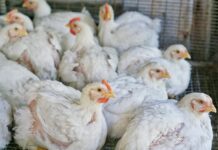
EU countries are being urged to step up surveillance and biosecurity measures to guard against possible new outbreaks of avian influenza this year.
The warning follows outbreaks of highly pathogenic Avian Influenza (HPAI) among wild and domestic birds in western Russia and Kazakhstan over the past few months. This region is a known autumn migration route for wild water birds heading to Europe.
Northern and eastern Europe are likely to be the most vulnerable to new Avian Influenza outbreaks given past experience. When HPAI was detected in the same area of Russia in the summers of 2005 and 2016, epidemics followed in northern and eastern Europe. If the pattern is repeated this year, HPAI is expected to arrive in the same areas of Europe in autumn or winter. Subsequent Avian Influenza spread to countries in southern and western Europe is also possible.
The alert is included in the latest update on Avian Influenza in Europe and beyond. The new report – which is compiled by EFSA, the European Centre for Disease Prevention and Control (ECDC) and the European Union reference laboratory for avian influenza – covers the period May to August 2020.
The report recommends that EU countries should, in accordance with EU legislation on risk mitigation and early detection systems for HPAI:
- Take measures to detect suspected cases of HPAI promptly and increase biosecurity measures at poultry farms.
- Warn veterinary and wildlife health authorities of the likely risk of HPAI introduction, and urge them to carry out observation and prompt testing of dead or sick wild birds.
Spread of the Avian Influenza virus is likely to be triggered by a sudden and persistent fall in temperatures in central Russia and Kazakhstan. Several studies demonstrate that cold weather conditions led to the rapid westward expansion of the HPAI virus by infected migratory birds during the 2005-2006 and 2016-2017 waves.
The risk of transmission of Avian Influenza viruses to the general public in Europe remains very low. However, to minimise the risk of transmission to humans, people are advised not to not touch dead birds without wearing appropriate personal protective equipment.
Source: EFSA

















